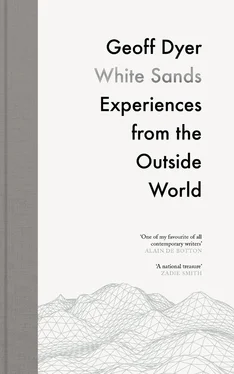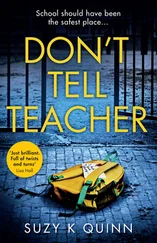‘I seem to be blind in one eye, the left, but I can sort of see out of it. Where have you gone?’
‘I’m here.’
‘So why are you just hallway?’
Jessica has often had problems with her eyes. Ten days earlier she’d gone to the ophthalmology department of the hospital with an ulcer on her cornea. That’s where we should go now, she said. We had health insurance, courtesy of her work, so she called and made an appointment. They could see us at nine-thirty. It was eight-thirty now, would take twenty minutes to get there in a taxi. Which meant there was time to do what we did every morning: go to Intelligentsia for our eight-ounce cappuccinos and twice-baked hazelnut croissants, which were not as nice as the Doughnut Plant doughnuts I’d had every day when we’d lived in New York for four months the previous autumn but which had become part of our unchangeable routine. Getting ready took longer than usual. I kept asking where the thing was, the thing that I kept my health-insurance and credit cards in, the Oyster card-holder thing. And my keys. As soon as she told me, I would ask about something else, and by then I wasn’t sure whether I’d picked up my cards and my keys and I’d be wondering if I needed my passport and it would turn out that I had my keys in my hand and my credit cards in my pocket. It took ten minutes to get out of the house, during which time Jessica’s patience quickly frayed. It was, she said, like dealing with a cross between a half-senile pensioner and a totally monged-out teenager.
We walked to the café. I held on to Jessica’s arm. The sidewalk was the sidewalk and the road was the road. There were people and cars, brilliant sunshine, colours. We waited in line and ordered the same things we ordered every day. We ate and drank as usual, and some of the world seemed to have come back. It was more like, as my mum used to say of people with some kind of mental trouble, that I was not all there.
Our Uber arrived and we were soon speeding along Venice Boulevard. I could now see something out of my left eye but I had no peripheral vision.
At the hospital, a nurse immediately gave me drops to dilate my pupils so that the ophthalmologist could take a look inside. As a result, my vision, having improved slightly in the taxi, became distorted in both eyes. An already bright world became brighter still. The ophthalmologist did simple tests, covering up one eye at a time, waggling her fingers on each side of my head, to test my peripheral vision.
‘How many fingers am I holding up?’
‘Two.’ I could see them on the right side. On the left side, I couldn’t even see her arm. The weird thing was that the result was the same whether using my left or right eye.
Within minutes she had succeeded, where I had failed, in eliminating some potential causes. Since the problem was the same in both eyes — lack of vision on the left — the cause must lurk behind the eye, in the brain. So it was either a migraine or a stroke. This was the first time the word ‘stroke’ cropped up. It was a word I didn’t want to hear, but it was what Yeats, in a quite different context, called the surprising word that is also exactly the right word. If I’d had my wits about me I might have joked, when my sight first went, that I’d had a stroke — but the reality, the ophthalmologist made quickly clear, was no laughing matter. We needed to go straight down to Emergency, she said, picking up the phone to alert them to our imminent arrival. Since I was ambulatory it would be faster if we walked rather than waited for a wheelchair.
So that’s what we did. We ambulated through the hospital as we had previously walked to the café, with me clinging to Jessica’s arm. The difference, because of the drops, was that, besides acting like an ageing teenager on E, I now looked like one as well: my pupils were the size of dinner plates.
A nurse showed us into a curtained cubicle. I changed into one of those hospital gowns that tie up at the back, the purpose of which seems to be to enfeeble you, to reduce your capacity for independent action. To walk even a few steps risks the ignominy of exposing your bottom to the world. You are now a patient, the gown decrees, the recipient of treatment, someone to and for whom things are done. An ER doctor saw me straight-away, went through the same tests as the ophthalmologist while adding some of his own. He touched my legs and face on both sides, asked if I could feel what he was doing — I could. I could also grip hard with either hand and extend both arms and legs. I could swallow and speak perfectly. After each of these little tests the doctor said ‘Good.’ It wasn’t just reassuring to hear this; there was also the pride you felt in school, that you still feel in the course of a tennis lesson, when you get the answer right or execute a stroke correctly: the clever-kid-in-class glow, the sense of achievement and pride that you are not such a klutz, not a complete physical and mental wreck, like that guy moaning over there, all whacked out and smashed up on a gurney. Less encouragingly, I had been downgraded from my previous ambulatory status: I was now wheeled along on my own gurney to the MRI scanner in a different building. With my pupils enormously dilated, the Californian light was so strong I had to keep my eyes screwed shut.
There was only a short wait before I was fed into the MRI scanner. The procedure was very similar — but quite different — to one I’d had a few days earlier in the Perceptual Cell at James Turrell’s retrospective at the Los Angeles County Museum. The highlight of that exhibition, for the fortunate few who’d managed to book or cadge a slot, was to be slid horizontally and alone into an MRI-looking gizmo by two assistants in white lab coats (both female, as gorgeous as the nurses in the film of The Diving Bell and the Butterfly ). Once sealed inside, you were bathed in soft blue light. There were two settings, and I had, naturally, opted for the strongest. The light began to pulse and change. Headphones played beatless music that encouraged complete surrender to a non-corporeal world of pure light. As the fractal geometries and strobes of colour gathered pace it became impossible to tell whether these glowing patterns and acid flashes were emanations of an external world or if they were in your head. Deep space or inner space? Either way it was like a glimpse of infinity. Infinity, not eternity. The experience only lasted ten minutes; it was possible to lose track of oneself but not of time. I would have liked to spend hours in there, a whole day even.
In the same length of time that I’d spent in the Turrell Cell , the MRI made a map of whatever had happened in my brain. I emerged from the clattering soundtrack of the scanner, clambered onto the gurney and was wheeled back to my cubicle to await the results. The doctor returned within an hour.
‘I’m afraid there has been a stroke,’ he said. ‘An ischemic stroke.’ It had occurred at the back of my brain on the right side, affecting the working of the left half of my vision. They’d need to keep me in hospital overnight for more tests. My immediate reaction — Shit, I’ve had a stroke — was followed immediately by a second: Thank god we have health insurance. These, in turn, were quickly followed by a third: that a series of trapdoors might be in the process of opening up beneath me. One thing leads to another, each more serious than the previous. This has happened because something else is not working correctly, and that is wrong because something else is faulty. To find out what that next thing is, it will be necessary to burrow more deeply into your being and discover how much if any of that — your continued being — you have left.
I was wheeled up into what looked, to my still dilated, NHS-habituated eyes, like a business-class hospital room. Jessica went back to our apartment to get various things I’d need for my stay. In the rush to get out of the house and into the café—why hadn’t we thought ahead, why were we so obsessed with having our coffee and twice-baked hazelnut croissants? — I had arrived like a guest who turns up at a party empty-handed. I hadn’t brought a book, because I’d be unable to read. But my regular fortnightly column for the New Republic was due the next day and I had left my laptop at home. The column involved looking closely at a news photograph and writing five hundred words about it. Fortunately, I’d already chosen the photograph, so, in the interludes between getting wheeled in and out of tests, I began jotting down my blurry thoughts about this remembered image on the back of an envelope. One of the intervening tests was an ultrasound of my heart and carotid artery, which would, in the words of the technician running it, ‘show us where we’re at.’ I could hear my heart whooshing and splooshing on the monitor. I had no idea if this was how it was meant to sound, but I had absolute confidence in my cardiovascular system.
Читать дальше












